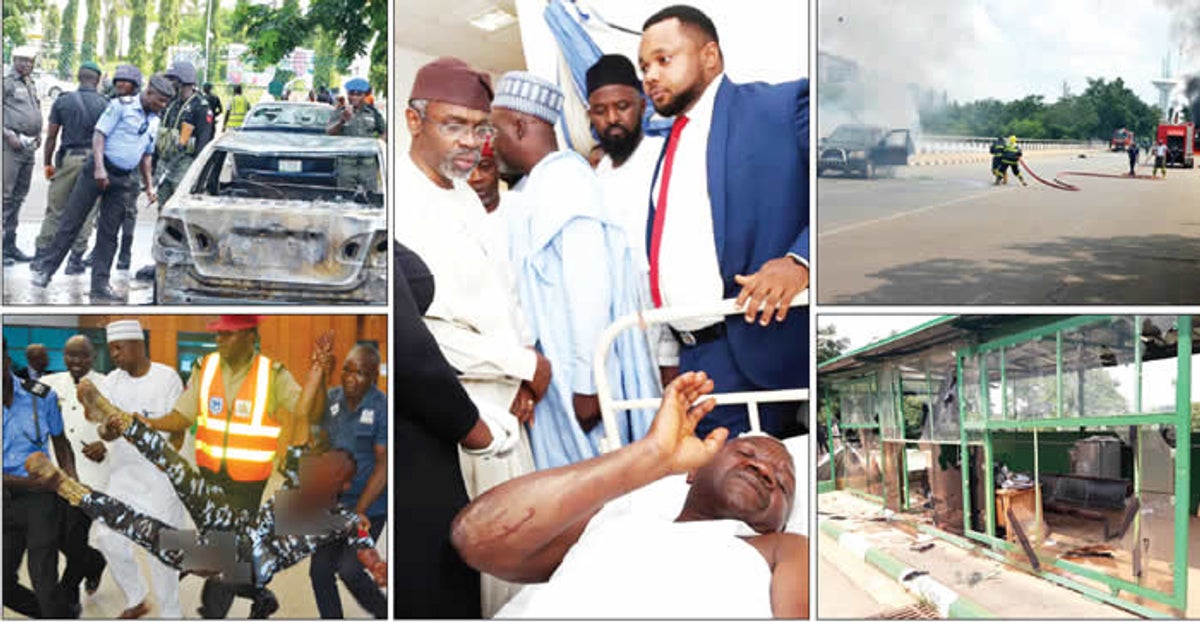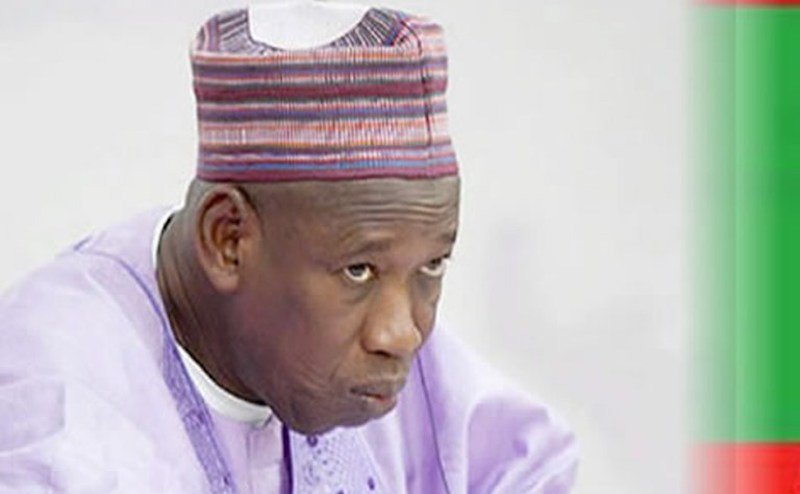Members of the Islamic Movement of Nigeria, popularly known as Shi’ites, on Tuesday invaded the National Assembly and shot two policemen.
The sect members, who were protesting the continued incarceration of their leader, Ibrahim Zakzaky, that had been in detention since December, 2015, also attacked six other policemen at the National Assembly with stones and clubs.
One of our correspondents learnt that the Shiite members overpowered the policemen at the gate of the National Assembly, collected one of their guns and shot the two security operatives.
They entered the main entrance popularly known as MOPOL gate and vandalised the gate house. They also burnt three vehicles and destroyed many others.
The sect unleashed terror on security operatives when tear-gas canisters were thrown to disperse them. There were fears among the National Assembly staff on Tuesday that one of the policemen, who were shot, had died.
But when contacted, the Federal Capital Territory Police spokesman, Anjuguri Manzah, said no policeman died during the clash with the IMN members, He said, “We don’t have any casualty, no policeman died. Why would we hide such a thing? There was no casualty.”
He also denied that the IMN members seized a gun from a policeman. He said, “No police gun is missing, we have no record that the Shiite members snatched guns from our men.”
During the protest by the Shiites, there was pandemonium at the National Assembly as its gates were closed. Staff and visitors ran for dear lives during the clash between the sect and the police.
Visitors to the federal parliament were barred from entering the premises as of the time of filing this report.
Once the information filtered into the House of Representatives, which was still in plenary as of the time of the attack, the Speaker, Mr Femi Gbajabiamila, called for adjournment of the session.
He said, “We have to adjourn now for security and legislative reasons. Leader…” The Majority Leader, Alhassan Ado-Doguwa, moved a motion for adjournment, while the Minority Leader, Mr Ndudi Elumelu, seconded the motion.
The Speaker, other leaders and members of the House, after the plenary, visited the victims at the clinic.
While the National Assembly Clinic confirmed that seven persons were injured, most of whom were security men, a security source disclosed that the Divisional Police Officer, National Assembly Division, Mr Umar Sambo, had gunshot, knife cut and stone injuries.
Speaking with journalists, the Director of Medical Services, National Assembly, Dr Bashir Hamza, said seven victims were taken to the clinic, most of whom he said were policemen.
He said, “They were brought here as an emergency. As usual, when patients come like that we don’t have to confirm whether it is a staff member or a visitor; we just first of all rush to save the life.
“That was what had exactly done. As soon as they were brought in, we had doctors on the ground who quickly received them. They were other medical personnel also on the ground who attended to them.
“One of the patients had a cut which looked like knife cut on the head and was bleeding profusely. That was immediately attended to, to stop the bleeding. There was another one with gunshot wound on the left shoulder. It was quickly attended to too.
“In all the cases that we have seen – I think we have seen seven persons with various degrees of injury, we made sure that they were stabilised, with the exception of the first one that I mentioned who has been losing a lot of blood and has started becoming restless.
“In our medical knowledge, we know that people (patients) who start to become restless are getting out of control, probably the bleeding is much higher than we anticipated or there is internal bleeding in the head, because it is appearing (to be) swollen.
“That one is to be transferred to the Trauma Centre of the National Hospital (Abuja). That will be ensured because we have ambulances on the ground, ready for evacuation.
Asked about the profile of the persons attacked, the director said, “The majority are police officers. As we learnt, it was a protest. So, people who would try to go against a protest are usually police officers, except if you are unlucky to (have been) caught up between (them). The majority are police officers.”
Findings by The PUNCH revealed that some of the security personnel who were injured by protesting members of the IMN were admitted to the National Hospital in Abuja.
A source in the hospital said, “The security personnel were seriously injured and were immediately moved to the trauma centre on arrival. The management of the hospital had been placed on the alert before they were brought in. Their cases was emergency because the degree of the injuries was severe. Our team of experts immediately swung into action and they have stabilised.”
The Senate did not suspend plenary while the pandemonium lasted but its ad hoc committee on Media and Publicity addressed journalists on the issue.
The Chairman of the media panel, Senator Adedayo Adeyeye, said the Senate was worried about the development and had started discussing the porous security lapses with the National Assembly complex.
He said, “One of the issues we have discussed is the security within the National Assembly premises. It is a matter that is being looked at because parliaments across the world are not this porous.
“Be that as it may, we also recognise the fact that the National Assembly is a public place for all Nigerians. All Nigerians reserve the right if they follow proper channel and procedure to come in here and meet with their representatives.
“Where there are breaches in terms of procedure and regulations guiding such matter, the matter will be looked at inside the chamber.
Police arrest 40 Shi’ite members
The FCT police spokesman, in a statement later on Tuesday, said the command had arrested 40 members of the IMN who invaded the National Assembly and shot two policemen and an operative of the Nigeria Security and Civil Defence Corps.
He said the two policemen that were shot in the legs were recovering at the National Assembly clinic. According to him, the sect also attacked six other policemen with stones and clubs.
The Shi’ite members vandalized several vehicles as they attempted to take over the building, but they were resisted by the policemen and other security operatives on duty.
Our correspondent observed a police team at Samuel Ademulegun Avenue, near the National Mosque, searching commercial buses in order to fish out the sect members.
The leader of the operation, an Assistant Commissioner of Police, whose name could not be ascertained, was seen with his team harassing commuters and other passersby.
The policemen, who were wielding sticks and rods, also prevented our correspondent from talking to about six suspects, including a child in their patrol van.
The FCT police spokesman, DSP Anjuguri Manzah, said in a statement that investigation had commenced into the attack.
He denied that the IMN members snatched police guns, adding that they were repelled by the police when they attempted to force their way into the NASS premises.
Manzah stated, “The group, which started its activity camouflaged in a peaceful procession, became violent and tried to force their way into the National Assembly.
“Police on the ground, however, acted proactively, professionally and used minimum force to disperse the unruly protesters.
“Forty members of the sect have been arrested in connection with the violent protest and investigation is in progress.”
The command explained that adequate measures had been put in place to prevent further security breaches.
Reps to debate Shi’ites attack on Wednesday
Meanwhile, the attack on the National Assembly by the Shi’ites would be discussed at the plenary on Wednesday.
Efforts to get the Speaker, Femi Gbajabiamila, to react to the incident proved abortive.
A credible source in the office of the Speaker, who did not want to be named, disclosed that Gbajabiamila would raise the matter on the floor of the House.
“He doesn’t want to say anything because it will be raised on the floor,” the source said.
IG orders 24-hour surveillance in FCT
Meanwhile, the Inspector-General of Police, Mohammed Adamu, has ordered a 24-hour police surveillance in the FCT and its environs.
Similarly, the Commissioners of Police and their supervisory Assistant Inspectors- General of Police in states contiguous to the FCT were also placed on the alert to ensure maximum security in their respective Areas of responsibility to avert any possible breach of public safety and security.
The force spokesman, DCP Frank Mba, in a statement said the IG had ordered a speedy and diligent investigation into the incident as well as prompt prosecution of all the sect members in custody in connection with the incident.
It added, “The IG reiterated his displeasure with the unwarranted and unjustifiable attack and injury to nine police officers by members of the El-Zakzakky group and commended the restraint, maturity and professionalism displayed by Police personnel in containing the protest.”

 News6 years ago
News6 years ago
 Featured6 years ago
Featured6 years ago
 Boss Picks6 years ago
Boss Picks6 years ago
 Headline6 years ago
Headline6 years ago
 Headline6 years ago
Headline6 years ago
 Headline5 years ago
Headline5 years ago
 Headline6 years ago
Headline6 years ago
 Headline6 years ago
Headline6 years ago













